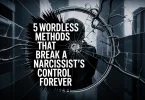It’s difficult to have a relationship with a narcissistic partner, especially for wives who may find themselves entangled in a web of emotional abuse. In this topic, I’m going to give you the weirdest behaviors of wives abused by narcissistic husbands.
Number 1: Withdrawing from Social Circles.
One significant red flag in identifying narcissistic abuse is the withdrawal of wives from their once-thriving social circles. Narcissistic partners employ various tactics, including manipulation and control, to isolate their spouses from friends and family. Emotional abuse often leads these wives to feel ashamed or fear judgment, making social interactions increasingly challenging. As the narcissistic grip tightens, the wife may find it difficult to engage with anyone beyond the toxic relationship, leading to a sense of loneliness and despair.
Consider a scenario where a wife, previously active in social events, gradually distances herself. The fear of judgment and the burden of explaining her partner’s erratic behavior becomes overwhelming in social gatherings. She may make excuses for her partner’s absence or unpredictable mood swings, unintentionally isolating herself. This withdrawal is not a mere choice but a consequence of the emotional manipulation she faces at home, leaving her feeling trapped and unable to reach out for support.
Number 2: Anxiety Around Men.
Constant belittlement and manipulation damage their self-esteem, resulting in discomfort in interactions with the opposite gender. The fear of judgment and the expectation of emotional abuse extends to encounters with men, creating an enduring state of unease. This anxiety serves as a survival mechanism, a learned response to navigate a world where trust is elusive and genuine connections are overshadowed by the looming presence of a narcissistic partner.
Imagine a wife whose anxiety around men intensifies as a consequence of narcissistic abuse. Once confident and at ease in social settings, she now second-guesses every interaction with male acquaintances. The partner’s comparisons and hurtful comments have left her feeling vulnerable and anxious. Even casual conversations with male friends or colleagues trigger discomfort, as she fears any friendliness might be misconstrued or weaponized against her in the ongoing emotional struggle at home.
Number 3: Abrupt Crying Spells.
The constant stress, manipulation, and emotional roller coaster in the relationship create a pressure cooker of emotions. Wives may find themselves breaking down unexpectedly, as the cumulative effect of enduring psychological abuse takes its toll on their mental well-being.
Picture a wife who, seemingly out of nowhere, bursts into tears during mundane activities. These emotional releases are her body’s way of coping with the overwhelming stress from living in a narcissistic environment. A simple disagreement or a critical comment can trigger an emotional outpouring, as the accumulated pain finds an outlet in tears, providing a temporary release from the emotional turmoil.
Read More:
5 Tell Tale Signs Of Narcissistic Collapse
10 Reasons Narcissists Don’t Like Being At Home
Strange Behaviors of Children Abused by Narcissistic Parents
Number 4: Unexpected Strong Emotions.
Wives may experience sudden bursts of anger, frustration, or overwhelming sadness, seemingly unrelated to the immediate circumstances. These strong emotions are a result of the ongoing manipulation and gaslighting, pushing them to their emotional limits.
Imagine a wife who, in a seemingly calm conversation, suddenly expresses intense anger or frustration. These strong emotions are not irrational; they are a response to the constant emotional manipulation experienced at the hands of a narcissistic partner. The unpredictability of these outbursts mirrors the chaotic nature of the abusive relationship.
Number 5: Loss of Appetite.
Narcissistic abuse takes a toll not only on emotional well-being but also on physical health. A common manifestation is the loss of appetite, as the stress and anxiety associated with the abusive relationship interfere with the wife’s ability to enjoy and engage with food.
Consider a wife who, once a lover of hearty meals, now struggles to eat. The weight of constant emotional manipulation has created a knot in her stomach, making the act of eating an ordeal. Loss of appetite becomes a physical manifestation of the psychological distress she endures, leaving her feeling physically and emotionally drained.
Read More:
Super Empath vs Greater Narcissist, Shocking Insights from a Real Narcissist Inside!
10 Reasons Why Narcissists Want To Harm and Destroy Other People
Revenge On The Narcissist – Here’s How You Get It
Number 6: Desire to Return Home Early.
A strong desire to return home early is a telltale sign of a wife trapped in a narcissistic relationship. The anticipation of facing the narcissistic partner’s mood swings or manipulative tactics makes the idea of staying out longer a source of anxiety.
Imagine a wife at a social event, constantly checking the time and expressing a desire to leave early. The eagerness to return home is not fueled by a lack of enjoyment but rather a fear of what awaits her. The narcissistic partner’s unpredictable behavior and potential repercussions for staying out late drive her to prioritize escaping the external environment and returning to the perceived safety of home.
Number 7: Resistance to Being Late.
The fear of facing the narcissistic partner’s wrath for any perceived transgression intensifies, making punctuality a crucial aspect of avoiding conflict and maintaining a semblance of control.
Consider a situation where a wife meticulously plans her schedule to avoid being late. The dread of potential consequences drives the fear of arriving home after an agreed-upon time.
Being punctual is not just a habit but a survival strategy, minimizing the risk of triggering the partner’s anger and manipulation.
Number 8: Sudden Pale, Tensed Face.
The physical toll of narcissistic abuse is often reflected in a wife’s appearance, mainly through a sudden shift to a pale, tense facial expression. The constant stress, anxiety, and emotional manipulation leave an indelible mark on her, manifesting in physical symptoms that others may notice.
Imagine a wife whose once vibrant face now appears pale and tense. This change in demeanor is not a result of mere fatigue but a reflection of the emotional strain she endures. The narcissistic partner’s behavior has physically affected her, leaving an imprint on her countenance that mirrors the internal turmoil.
Read More:
The Narcissist’s Initial Reaction To Your Silence or Absence.
The 4 Biggest Secrets of the Narcissist
Number 9: Frequent Head or Body Aches.
Stress is a formidable adversary, and wives subjected to narcissistic abuse often experience frequent headaches or body aches as a direct consequence. The emotional toll of the abusive relationship manifests physically, leading to persistent discomfort.
Consider a wife who regularly complains of headaches or body aches. These physical symptoms are not isolated incidents but are linked to the ongoing stress and emotional strain she faces at home. The body responds to the psychological distress, creating a cycle of physical discomfort that mirrors the invisible scars of narcissistic abuse.
Number 10: Avoidance of Eye Contact.
Avoidance of eye contact becomes a prevalent behavior in wives enduring narcissistic abuse. The constant belittlement and manipulation erode self-esteem, making direct eye contact an uncomfortable and threatening experience.
Imagine a wife who, during conversations, consistently avoids making eye contact. It’s not shyness but a learned response to years of enduring a partner’s critical gaze. Direct eye contact is an invitation for further scrutiny and a potential emotional attack, prompting her to look away as a protective measure.
Number 11: Over-Apologizing.
It is a coping mechanism developed by wives to navigate the unpredictable terrain of narcissistic relationships. The constant need to appease and avoid conflict results in excessive use of apologies, even for situations where they bear no fault.
Consider a wife who apologizes profusely for minor incidents or things beyond her control. This over-apologizing is not a reflection of her wrongdoing but a response to the constant need to diffuse tension and prevent escalation in the abusive relationship. Each apology becomes a shield against potential emotional attacks.
Number 12: Inability to Make Decisions.
Narcissistic partners exert control over every aspect of their spouse’s life, leading to an inability to make decisions independently. Wives may struggle to trust their judgment, fearing the consequences of making the wrong choice and inviting further manipulation.
Imagine a wife who hesitates to make even the simplest decisions, constantly seeking validation or approval. This indecision is not a lack of capability but a learned helplessness resulting from a narcissistic partner’s consistent undermining of her choices. The fear of making the wrong decision and facing repercussions perpetuates the cycle of dependency.
Read More: 10 Phrases That Scream “This Is A Narcissist”
Sharing Is Caring!






